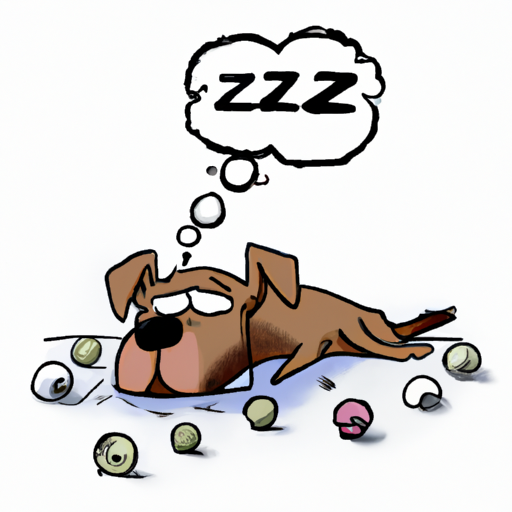1. Understanding Your Dog’s Sleep Pattern
As a caregiver, you might often wonder why your furry friend spends so much time sleeping. It’s important to understand that dogs, just like humans, have a unique sleep pattern.
Here’s a simplified breakdown of a dog’s sleep cycle:
- Stage 1: Light sleep, where the dog is easily awakened.
- Stage 2: Deeper sleep, where the brain activity slows down.
- Stage 3: The deepest stage of non-REM sleep.
- REM Sleep: The stage where dreaming occurs.
Understanding these stages could help you better cater to your dog’s needs and ensure they are getting the quality sleep they require.
2. Factors Influencing Your Dog’s Sleep
Several factors could influence how much your dog sleeps. These could be:
- Age: Puppies and older dogs tend to sleep more.
- Breed: Larger breeds often sleep more than smaller ones.
- Health: If your dog is unwell, they may sleep more than usual.
- Activity Level: Active dogs may require more sleep to recover.
3. The Role of Diet and Exercise
The quality and amount of sleep your dog gets can also be influenced by their diet and exercise.
| Diet | Sleep Impact |
|---|---|
| High-quality, balanced diet | Promotes better sleep and health |
| Poor-quality, unbalanced diet | Can lead to sleep disruptions and health issues |
Regular exercise is also crucial as it helps tire your dog out and promotes better sleep.
4. How to Help Your Dog Get Better Sleep
As a caregiver, there are several ways you can help your pooch get better sleep:
- Provide a comfortable sleeping area: A quiet and comfortable sleeping area is key.
- Maintain a consistent routine: Dogs thrive on routine. Regular feeding, exercise, and sleep times can help.
- Ensure enough exercise: Regular physical activity can help your dog sleep better.
- Consult a vet if needed: If you notice any drastic changes in your dog’s sleep pattern, it’s best to consult a vet.
5. The Importance of Sleep for Dogs
You might still be thinking, “But why do dogs sleep so much?” Well, sleep is as crucial for dogs as it is for humans. It helps with growth, healing, and brain development. Additionally, it keeps them energized and ready for their next adventure with you.
FAQs
Q: How many hours a day should my dog sleep?
A: On average, most dogs sleep for about 12-14 hours a day. However, this can vary based on age, breed, and health.
Q: Is it normal for my dog to sleep all day?
A: While dogs sleep a lot, if your dog is sleeping all day and showing a lack of energy when awake, it might be a good idea to consult a vet.
Q: Can a dog sleep too much?
A: Yes, excessive sleep could sometimes be a sign of health issues. If in doubt, always consult your vet.
Q: How can I ensure my dog is getting quality sleep?
A: Providing a comfortable sleeping environment, maintaining a consistent routine, ensuring a balanced diet, and regular exercise can all contribute to quality sleep.
Q: Should I wake my dog up from a nap?
A: Unless necessary, it’s best to let sleeping dogs lie. Just like humans, dogs need uninterrupted sleep for proper rest.



